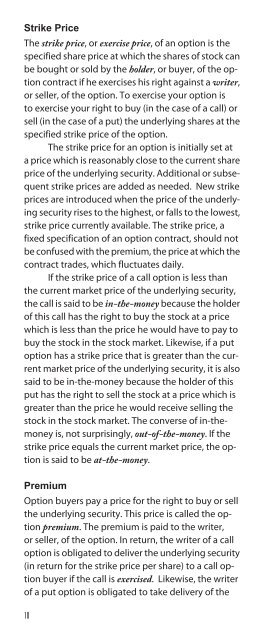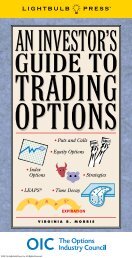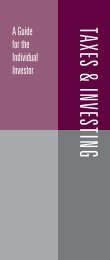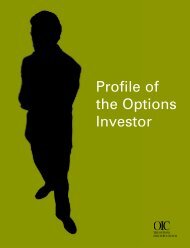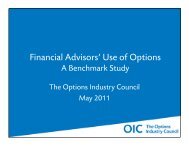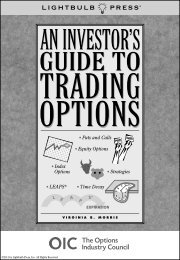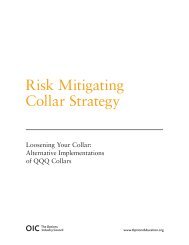Understanding Equity Options - The Options Clearing Corporation
Understanding Equity Options - The Options Clearing Corporation
Understanding Equity Options - The Options Clearing Corporation
- No tags were found...
You also want an ePaper? Increase the reach of your titles
YUMPU automatically turns print PDFs into web optimized ePapers that Google loves.
Strike Price<strong>The</strong> strike price, or exercise price, of an option is thespecified share price at which the shares of stock canbe bought or sold by the holder, or buyer, of the optioncontract if he exercises his right against a writer,or seller, of the option. To exercise your option isto exercise your right to buy (in the case of a call) orsell (in the case of a put) the underlying shares at thespecified strike price of the option.<strong>The</strong> strike price for an option is initially set ata price which is reasonably close to the current shareprice of the underlying security. Additional or subsequentstrike prices are added as needed. New strikeprices are introduced when the price of the underlyingsecurity rises to the highest, or falls to the lowest,strike price currently available. <strong>The</strong> strike price, afixed specification of an option contract, should notbe confused with the premium, the price at which thecontract trades, which fluctuates daily.If the strike price of a call option is less thanthe current market price of the underlying security,the call is said to be in-the-money because the holderof this call has the right to buy the stock at a pricewhich is less than the price he would have to pay tobuy the stock in the stock market. Likewise, if a putoption has a strike price that is greater than the currentmarket price of the underlying security, it is alsosaid to be in-the-money because the holder of thisput has the right to sell the stock at a price which isgreater than the price he would receive selling thestock in the stock market. <strong>The</strong> converse of in-themoneyis, not surprisingly, out-of-the-money. If thestrike price equals the current market price, the optionis said to be at-the-money.PremiumOption buyers pay a price for the right to buy or sellthe underlying security. This price is called the optionpremium. <strong>The</strong> premium is paid to the writer,or seller, of the option. In return, the writer of a calloption is obligated to deliver the underlying security(in return for the strike price per share) to a call optionbuyer if the call is exercised. Likewise, the writerof a put option is obligated to take delivery of the10


